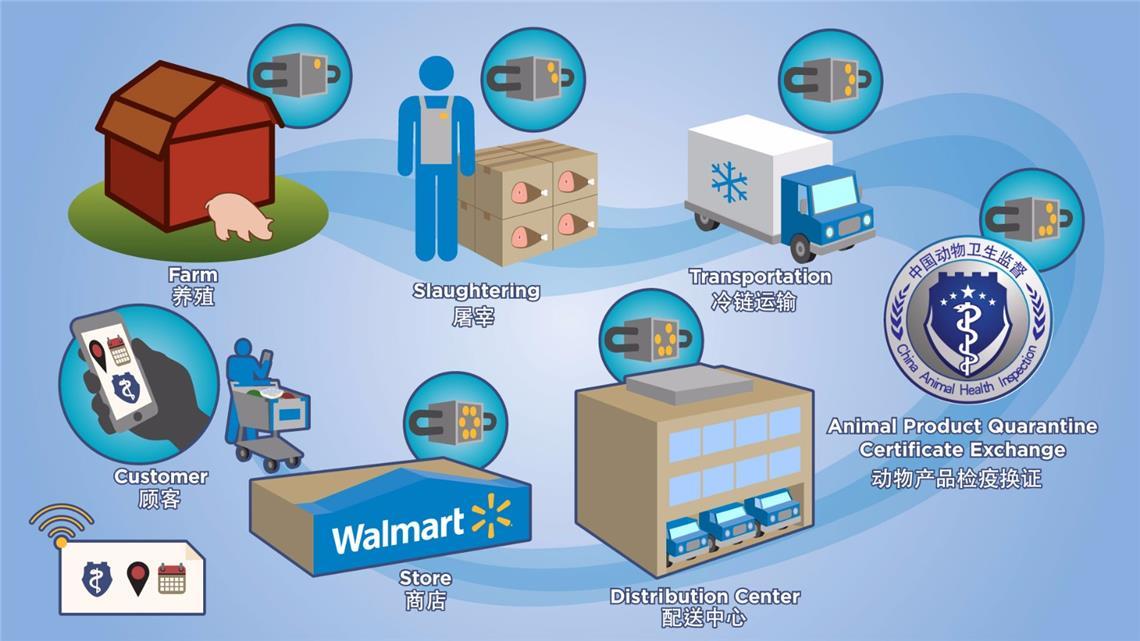Supply Chain + Blockchain: How does the blockchain set off a global supply chain revolution?
Another major area of blockchain landing will be the “supply chain”, which has already served many multinational companies such as Wal-Mart and Unilever.

What are the current pain points in the global supply chain?
A supply chain is a network of people and businesses involved in creating and distributing products and services, covering everything from raw material supply to final product and service consumption. A basic supply chain system involves material suppliers, manufacturers that turn materials into commodities, logistics companies that manage the transportation of raw materials and goods, and final retailers that sell goods to consumers.
- Ling listening | "V God" is not God: Vitalik Hangzhou line 48 hours close-up observation
- Blockchain version of Airbnb? Tripio Day orders for "blockchain + travel" broke 1,000, and the series plans to follow
- "Libra" in the course of history: a 50-year history of man-made currency
With the globalization of the supply chain, the above-mentioned simple network of suppliers, manufacturers and retailers has merged into a complex environment in which various products and materials are managed through different entities and geographically different management processes. . Therefore, supply chain management integrates procurement, manufacturing, distribution, and logistics into a tight system that requires collaboration among a wide range of stakeholders and plays a vital role in the success of the business.
However, today's global supply chains are inefficient, costly, and inflexible.
The global economy and business are growing rapidly, but the technology used in the supply chain has not kept pace with the times. In particular, the current global popularity of e-commerce and handheld devices has dramatically changed the way people shop, and the demand for customized products, convenient shopping experiences, and transparency of commodity sources is growing. These demands present challenges to the current supply chain, and supply chain technologies that are currently complex, inefficient, and difficult to provide data transparency throughout the process (ie, data tracking from raw materials to final consumer goods) are difficult to meet global economics and commerce. The rapid development.
How does the blockchain solve the pain points of the supply chain?
Some of the most pressing issues facing the supply chain can be solved by blockchain technology, as blockchains provide the most up-to-date way to record, transfer, and share data.
Essentially, a blockchain is a database system created and maintained by participants in a decentralized network that provides a secure and reliable architecture for communicating information and transactions that can be digitally recorded (eg, in the supply chain) Data and asset exchange between participants). With the broadcast of the distributed ledger in the network, each stakeholder maintains a copy, which prevents single points of failure or data loss, and also means that the blockchain is highly resistant to tampering with data. This accurate and tamper-proof recording ensures data integrity and access for compliance. Ultimately, blockchain can increase the efficiency and transparency of the supply chain and have a positive impact on everything from warehousing to delivery to payment.
Below are some of the blockchain projects that the original authors encountered, with advanced traceability, transparency, efficiency, and security to spur the potential of global supply chains.
Three "supply chain + blockchain" cases
1. Insolar is the first platform in the supply chain industry to support both public blockchains and private blockchains . This means it can be integrated with existing enterprise systems and even migrated from other blockchains. Insolar is also the first platform to allow modifications to smart contracts. Traditional smart contracts are immutable and good in many ways, but they do not meet business needs because they do not provide remedies similar to those available under traditional contracts. For example, according to a traditional contract, an enterprise can conduct a “effective breach of contract”, that is, if the enterprise determines that the execution cost is greater than the loss to be borne, it intentionally defaults and pays the resulting damages. This option is not available under traditional smart contracts. Thus, modifiable smart contracts are critical to a business-ready blockchain because they reflect the reality of the contractant's actual behavior. Insolar enables smart contracts that can be modified and terminated to dominate the competition. The company met with Fortune 500 companies to discuss how to develop blockchain applications for their operations and recently joined the Blockchain in Transport Alliance, which brings together transportation, finance and A leader in technology, aiming to establish the first set of specific blockchain standards for the transportation industry.
2. Hyperledger Fabric is a private blockchain network designed for commercial applications. Recently, it established a Special Interest Group (SIG) to facilitate technical and business-level dialogue related to blockchain technology use cases in supply chain management. The Hyperledger architecture provides features such as a distributed ledger framework and smart contracts. These features are applicable to a wide range of commercial applications, including the supply chain. However, Hyperledger uses only private blockchain technology. This means that it is less decentralized and cannot support multi-platform interoperability than Insolar projects that support both shared and private blockchains. It is less useful because it cannot interact with other chains and does not allow modification of smart contracts. Although Hyperledger supports block trades, it does not support long-lasting transactions (not more than the block time).
3. Skuchain is another private blockchain network designed for supply chains in international trade. Its platform provides tools to control inventory purchases for all stakeholders . The platform combines blockchain technology with Internet of Things (IoT) technology innovations such as radio frequency identification (RFID). However, the fact is that Skuchain relies on a private blockchain and does not allow the use of modifiable smart contracts, which means it lacks decentralization and some versatility. Similar to Hyperledger, it lacks Insolar's multi-platform interoperability.
Records are traceable and cannot be tampered with
Blockchain data is immutable and requires digital signatures to confirm information ownership. If multiple companies work together, they can use the blockchain system to record data on the location and ownership of the relevant material or product. This data is stored in a blockchain that provides a complete history of all items in the supply chain. Any member of the supply chain can see the movement of the material between the companies and the consequent circumstances. These data records cannot be changed and are highly traceable. If the product is defective, the source of the problem can be identified more quickly, thereby improving product recall efficiency and resolving conflicts among various stakeholders in the supply chain.
A highly transparent and complete list of product flows helps companies make better decisions . It gives stakeholders and customers more confidence in product quality. Increased transparency is also a tool to combat fraud and counterfeiting.
save costs
Due to the inefficiency of the supply chain, a lot of waste is caused. This problem is particularly prominent in the perishable food industry. The tracking method and data transparency provided by the blockchain can help companies identify these inefficient wastes and implement cost-saving measures in a targeted manner. The use of blockchains also eliminates the costs associated with inflows of funds, outflows of various bank accounts, and payment processing procedures. Such costs cut profit margins, so it is important to be able to exclude them.
Interoperability
One of the problems with current supply chain technology is the integration of data between each partner across processes. In contrast, blockchain is a distributed system of unique and transparent data storage, and each side of the network is committed to adding new data and verifying its integrity. This means that all information stored on the blockchain can be accessed by all parties in the network, so a company can easily verify that another company is broadcasting on the entire network.
Replace electronic data exchange system
Many companies rely on electronic data interchange systems (EDI) to send information to each other. However, this data is output in batches instead of in real time. Therefore, if there is a lack of freight or a change in price, this information will only be available to other participants in the supply chain after the next batch of EDI is awarded. However, with the blockchain, information can be updated in real time and quickly communicated to all interested parties.
Looking to the future
Several large companies in the supply chain industry are already embracing distributed systems based on blockchain and building resources to encourage their use. For example, Wal-Mart uses blockchains to track the pork it buys from China, including the source of each piece of meat, the location of processing and storage, and the date of sale. Unilever, Nestle, Tyson and Dole also use blockchains for similar purposes. BHP Billiton, the world's largest mining company, will use blockchains to track and record data throughout the mining process with suppliers. Diamond giant De Beers also uses blockchain technology to track gems from mining to sale to consumers. As time goes by, more global supply chain platforms will use blockchain technology to rationalize the way information and materials are shared.
in conclusion
Blockchain technology is transforming business in many different ways, from production and processing to logistics and accountability. Supply chain management is a particularly important use case because each stage of the process can be registered and validated to create transparent and non-tamperable records. Therefore, the use of blockchains in the supply chain has the potential to eliminate the inefficiencies common in traditional management models and revolutionize global supply chain management. Author | mina down
Translator | Maggie
Production | First Class (First.VIP), please keep this information.
We will continue to update Blocking; if you have any questions or suggestions, please contact us!
Was this article helpful?
93 out of 132 found this helpful
Related articles
- Direct access to the Yunqi Conference, a literary view of the ant blockchain ecological summit
- Lambda He Xiaoyang: It is foolish to change the white paper, and the blockchain is advancing in exploration.
- QKL123 market analysis | Bitcoin 200-day moving average shock, the market faces the choice of cattle and bears (0926)
- Babbitt Column | Deng Jianpeng: Gibraltar Blockchain Regulatory Policy and Its Deep Thoughts
- The real story of the turmoil in the repo market, why do bitcoin have better anti-vulnerability?
- Yesterday Bitcoin computing power plummeted 30%? The actual situation is not that simple
- Interview with Babbitt | Expanding the definition of smart contracts, how does Chainlink build the safest predictor?






